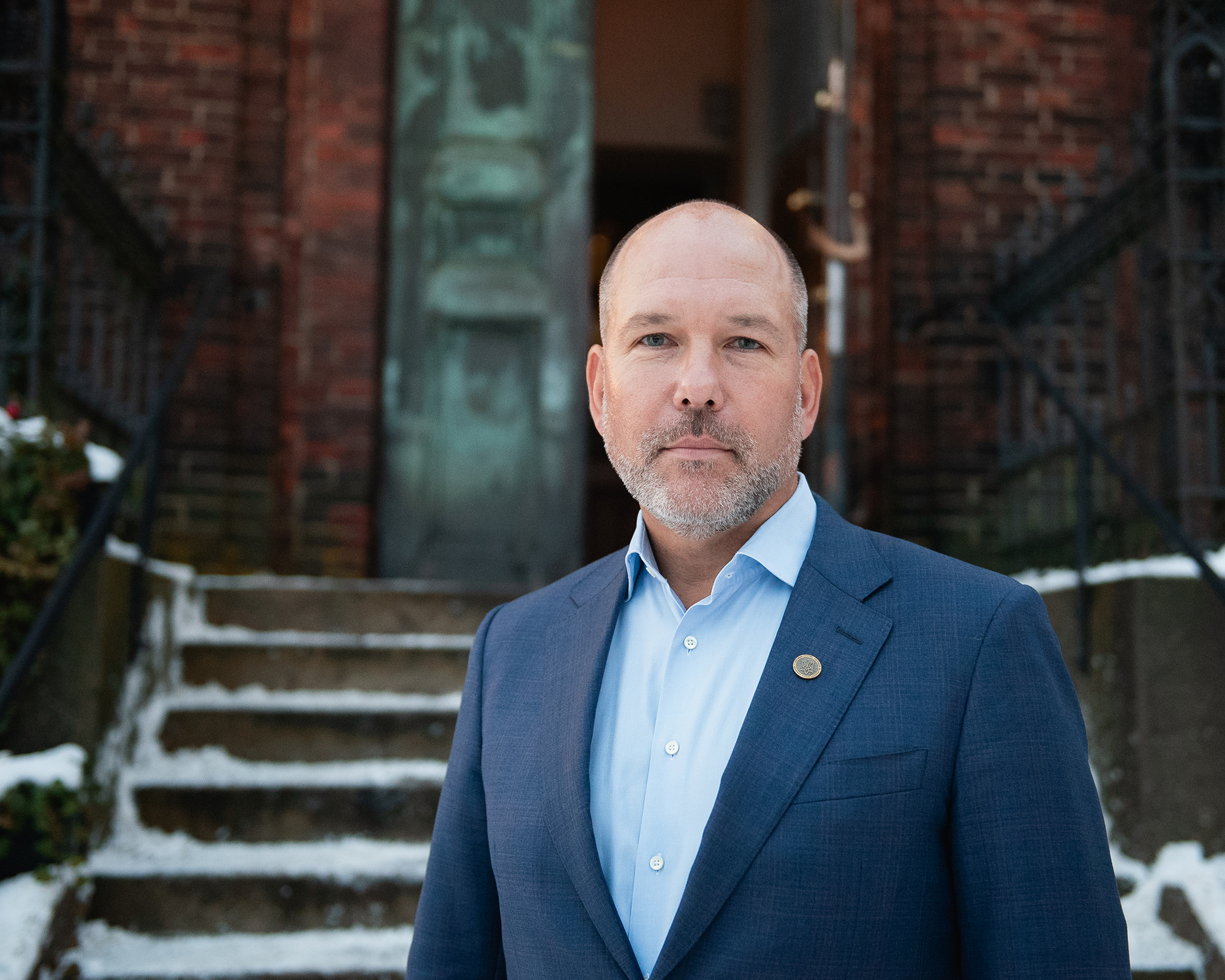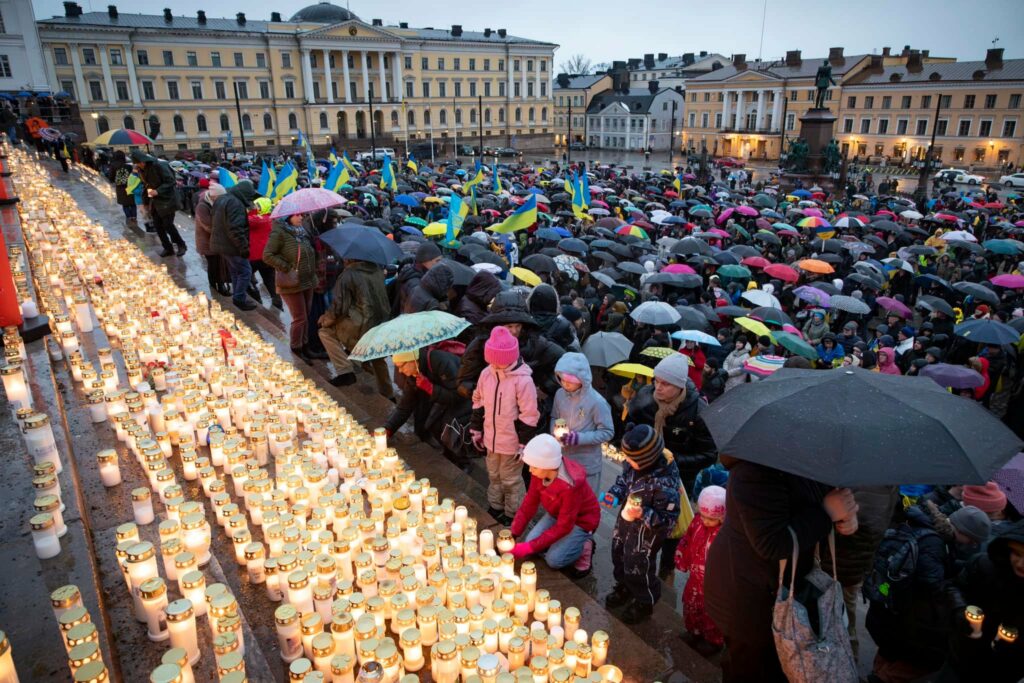One percent of GDP for Ukraine – President of the Ukrainian World Congress calls for more support from the Nordic countries

According to Pavlo Grod, Ukrainian diasporas are actively helping Ukraine in nearly every country, except Russia and Belarus, where it is not possible. They provide humanitarian aid, assist displaced Ukrainians, and organize advocacy campaigns to garner support for Ukraine. PHOTO: NADIIA FEDOROVA
Nadiia Fedorova
Published 28.11.2024 at 2:22
The president of the Ukrainian World Congress (UWC), Pavlo Grod, recently visited Finland as part of his mission to Northern Europe. We met him after a Sunday service for Ukrainians at the Cathedral of St. Henrik in Helsinki. For him, attending community events and engaging directly with Ukrainians in Finland are priorities, alongside meetings with Finnish government officials.
A Canadian-born Ukrainian, Grod has led the UWC since 2018 and has been involved in advocacy for Ukraine for decades. His work has made him the first Canadian who is not a government official to be sanctioned by Russia in 2014.
Finland is the final stop on Grod’s Northern European mission, aimed at strengthening support for Ukraine. “Northern European countries, on a per capita basis, have been among the largest contributors to Ukraine’s defense. But we need them to enhance their support even more—up to 1 percent of their GDP,” says Grod. He emphasizes that strong support from European countries would reduce the risk that the U.S. under Trump’s presidency would pressure Ukraine into capitulation.
Another focus of his tour is fostering better support for displaced Ukrainians, particularly in the area of education. “We need to create an environment where Ukrainians can maintain their national identity,” Grod explains. He advocates for institutions such as Ukrainian schools, cultural centers, churches, and clubs, which he describes as crucial for helping Ukrainians “stay Ukrainians from cradle to grave.”
Grod also raises the importance of recognizing Holodomor—the man-made famine of 1932–33—as genocide. While 35 countries have done so, Nordic nations have yet to follow suit. Finland, for instance, lacks a legal mechanism for passing resolutions on historical matters in its parliament. Despite this, 164 out of 200 Finnish MPs signed a statement last year condemning Holodomor as genocide, marking progress toward recognition.
“Holodomor is an important part of the historical equation that connects the crimes of Soviet Russia to its attempts to destroy the Ukrainian nation today,” Grod asserts.
Different diasporas, common challenges
According to Pavlo Grod, almost all Ukrainian communities worldwide share two challenges: indifference and assimilation. He notes that as people settle into their host countries, they often focus on their personal lives and feel powerless as it relates to helping Ukraine.
Children frequently adopt the language of their host country, forgetting Ukrainian and cutting ties with their heritage. Grod distinguishes between integration—becoming a productive member of society—and assimilation, which he views as dissolving one’s national identity. Countries lacking established Ukrainian infrastructure, including Finland to some extent, experience faster rates of assimilation.
Many foreign leaders say they want displaced Ukrainians to return home to help rebuild their country, but the reality is more complicated. Ukrainians are a valuable workforce in their host countries. Most of them are highly educated—the percentage of those with post-secondary education is higher than in many Western countries. However, many are ready to take jobs that locals no longer want, helping to fill labor shortages. Because of this, foreign leaders might not be eager to see Ukrainians return home or to support efforts to help them keep their cultural identity.
In this context, Pavlo Grod urges the diaspora to continue advocating. “The leaders of the countries are not going to make change unless we demand it,” he stresses.

Grod views diasporas as a powerful voice for Ukraine, capable of conveying its story in local languages and in ways that resonate with local audiences.
Advocacy strategies of UWC vary by country, reflecting political differences. For example, for the second anniversary of the invasion, UWC has prepared informational packages for different regions. “In countries of Middle-Asia, we focused on prisoners of war and kidnapped children—the human side of the war. While the message in the US was ‘give more weapons to Ukraine,’” shares Grod.
The largest diaspora in silence
The Ukrainian diaspora in Russia, estimated at between 3 and 10 million people, is the largest in the world. Yet after the beginning of the full-scale war, it remains notably silent.
Grod sees historical reasons for this silence. During the late 1990s and early 2000s, the Russian government tolerated Ukrainian organizations as long as they were not political. Ukrainians could put up a monument to Taras Shevchenko or participate in traditional dance groups, but no schools or libraries were allowed.
In 2014, Russia justified its aggression by falsely claiming that Russians were discriminated against in Ukraine. This claim seemed absurd, as there were numerous Russian-language schools in Ukraine, while Russia had no Ukrainian-language educational institutions at all.
After 2014, Russia began prosecuting Ukrainian community leaders. In 2019, the UWC was declared an “undesirable organization.” The full-scale invasion in 2022 led to the closure of even cultural associations. Understanding the need to safeguard Ukrainian activists and acknowledging the heavy presence of Russian intelligence in Ukrainian communities inside Russia, the UWC cut all ties with them.
Grod believes many Ukrainians in Russia have assimilated under constant pressure, accepting the “Russian world” ideology. Yet, he holds hope for those who have preserved their identity. Many of them are descendants of those exiled as Ukrainian nationalists in earlier times.
“I encourage them to quietly organize, quietly continue to educate their children to be Ukrainians. There are many ways in which they can disrupt the regime and help Ukraine from inside Russia,” Grod advises.
What is the Ukrainian World Congress?
The UWC is the umbrella organization for Ukrainian communities worldwide, connecting organizations in over 80 countries. For decades, the UWC has served as the voice of the global Ukrainian community. It was founded in 1967 to raise awareness about Ukraine and its people, who were subjected behind the Iron Curtain at that time. In the last 10 years, the Congress has been focusing on supporting Ukraine’s sovereignty and territorial integrity against Russian aggression.